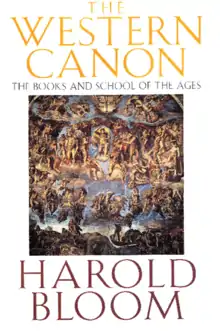The Western Canon
The Western Canon: The Books and School of the Ages is a 1994 book about western literature by the critic Harold Bloom, in which the author defends the concept of the Western canon by discussing 26 writers whom he sees as central to the canon.
 Cover of the first edition | |
| Author | Harold Bloom |
|---|---|
| Country | United States |
| Language | English |
| Subject | Western canon |
| Publisher | Harcourt Brace |
Publication date | 1994 |
| Media type | Print (Hardcover and Paperback) |
| Pages | 578 |
| ISBN | 978-1-57322-514-4 |
Summary
Bloom defends the concept of the Western canon by discussing 26 writers whom he sees as central to the canon:[1][2]
- William Shakespeare
- Dante Alighieri
- Geoffrey Chaucer
- Miguel de Cervantes
- Michel de Montaigne
- Molière
- John Milton
- Samuel Johnson
- Johann Wolfgang von Goethe
- William Wordsworth
- Jane Austen
- Walt Whitman
- Emily Dickinson
- Charles Dickens
- George Eliot
- Leo Tolstoy
- Henrik Ibsen
- Sigmund Freud
- Marcel Proust
- James Joyce
- Virginia Woolf
- Franz Kafka
- Jorge Luis Borges
- Pablo Neruda
- Fernando Pessoa
- Samuel Beckett
Bloom argues against what he calls the "School of Resentment", which includes feminist literary criticism, Marxist literary criticism, Lacanians, New Historicism, Deconstructionists, and semioticians. The Western Canon includes four appendices listing works that Bloom at the time considered canonical, stretching from earliest scriptures to Tony Kushner's Angels in America. Bloom later disowned the list, saying that it was written at his editor's insistence and distracted from the book's intention.[3]
Reception
Norman Fruman of the New York Times wrote that "The Western Canon is a heroically brave, formidably learned and often unbearably sad response to the present state of the humanities".[4]
The novelist A. S. Byatt wrote:
Bloom's canon is in many ways mine. It consists of those writers all other writers have to know and by whom they measure themselves. A culture's canon is an evolving consensus of individual canons. Canonical writers changed the medium, the language they were working in. People who merely describe what is happening now don't last. Mine includes writers I don't necessarily like. D. H. Lawrence, though I hate him in a way, Jane Austen, too.[5]
References
- Harold Bloom, The Western Canon, 1994, p. 2
- Tucker, Ken (21 October 1994). "Book Review: 'The Western Canon: The Books and the School of the Ages'; Books". EW.com. Retrieved 2011-05-01.
- Pearson, James. "Harold Bloom [Interview]". Vice Magazine. Retrieved 23 September 2020.
- Fruman, Norman (9 October 1994). "Bloom at Thermopylae". The New York Times.
- Lawrence, Tim; Guttridge, Peter. "Reloading the ancient canon". The Independent (London). 21 November 1994.